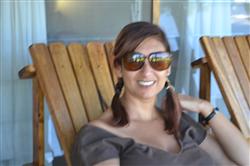Tima is a Canadian expat living in Lusaka with her husband and son. They moved to Zambia when her husband was transferred there with his job. Having lived abroad for 15 years and experienced expat life in a number of different countries, Tima shares her insights about life in Zambia, offering some first-hand advice for those contemplating a move there.
Learn more about expat life in Zambia in the Expat Arrivals Zambia guide or read more expat experiences in Zambia.
About Tima
 Q: Where are you originally from?
Q: Where are you originally from?
A: Canada
Q: Where are you living now?
A: Lusaka, Zambia
Q: When did you move to Zambia?
A: May 2011
Q: Did you move with a spouse/children?
A: Spouse and one child
Q: Why did you move to Zambia; what do you do?
A: My husband’s job with Damco brought us here. I then began to work at the American International School as a 2nd grade teacher.
About Lusaka
Q: What do you enjoy most about Lusaka, how’s the quality of life?
A: I love the weather. It’s peaceful here. Most roads are paved. There are great malls, supermarkets and movie theatres.
Q: Any negatives? What do you miss most about home?
A: I’ve lived abroad for almost 15 years. Whenever there are power issues, I tend to get frustrated. It’s a slower pace. Getting landlords to fix things quickly can be a challenge.
Q: Is Lusaka safe? Are there any areas expats should avoid?
A: Compared to other African cities, it’s very safe. I don’t go to town. But have never felt unsafe or uncomfortable anywhere.
Q: How would you rate the public transport in Lusaka? What are the different options? Do you need to own a car?
A: As an expat, I would suggest getting a car. The city buses are confusing. I don’t think they are all that reliable, as I often hear of people being late due to the buses. If you don’t drive, or are uncomfortable driving, it’s fairly easy to find a driver.
Q: How would you rate the healthcare in Zambia?
A: There are some new clinics that have opened in the last couple of years. I’ve had a horrid experience at one clinic and was taken care of very well at another. Definitely ask others about their experiences and check a place out before you get sick and are in need of care.
About living in Lusaka
Q: Which are the best places/suburbs to live in Lusaka as an expat?
A: I live in the Leopard’s Hill area. It’s close to the school and quiet. It’s far from the malls. Estate Lodge is a great place to live with lots of land. Ibex Hill is close to the American Embassy. Roma has lovely houses, and you often see people running in the neighbourhood.
Q: How do you rate the standard of housing in Lusaka?
A: I found it great. Compared to where we lived before moving to Zambia, the houses are lovely and reasonably priced. Although, I’ve heard some people complain it’s expensive. It really depends where you are coming from. Most places, the rent includes security, Zesco (power) and water.
Q: What’s the cost of living in Zambia compared to home? What is cheap or expensive in particular?
A: More expensive. You’re an expat. Most things are brought into the country, so you are paying for shipping and duty. Cereal that may cost $3 at home is $7 here.
Q: What are the locals like; do you mix mainly with other expats?
A: I have a mix of friends. Mainly expats; however, the locals I know and are friends with are great. Zambia is an English-speaking country, so there isn’t a language barrier. There is a larger population of middle and upper-class Zambians. If you go to a restaurant, it’s probably 50 percent Zambians.
Q: Was it easy meeting people and making friends in Lusaka?
A: I started working as soon as I got here, so that helped. If you have children, you can meet other parents at school during pick up and drop off. The Hash House Harriers is a great way to meet people as well.
About working in Lusaka
Q: Did you have a problem getting a work visa/permit for Zambia?
A: Not at all, although my husband had a few issues. They ran out of books, so he had to “check in” every three months for a while.
Q: What’s the economic climate like in Lusaka, is there plenty of work?
A: If you’re an expat, then you’ve been brought in for a specific job. If the plan is to come here and find a job, it will be tougher.
Q: How does the work culture differ from home?
A: Working for a school, the culture isn’t too much of a difference. I do have a friend who is finding it very different. He is used to working where there is some flexibility. He wanted to take an early day to see his son’s school. He worked late one day, so he could take the time off, but was made to feel bad about it, and it was not looked well on. There seems to be a punching-in-punching-out mentality.
Q: Did a relocation company help you with your move?
A: Yes.
Family and children in Lusaka
Q: Did your spouse or partner have problems adjusting to their new home?
A: Our son was five at the time. He had a hard time adjusting to the move.
Q: Did your children settle in easily?
A: It took him some time. Mainly as Lusaka is a large city with people spread out. Play dates were hard to organise as I was also working.
Q: What are the schools like, any particular suggestions?
A: There are choices here. There are two IB schools, one more on the American side and one more on the British side. There’s a British School, Italian School and French School. All have great reputations. Research before you choose one. Many families choose the American School as it’s the most expensive thinking this means it’s the best. It is a great school, but may not be the best fit for your family.
And finally…
Q: Is there any other advice you would like to offer new expat arrivals?
A: You are in Africa. Lusaka has malls, cinemas and supermarkets, but it is still Africa. Many people come and see how Western it looks, and get frustrated when something goes wrong. It’s Africa. There will be many bumps, but with it many great experiences.
~Interviewed September 2013



